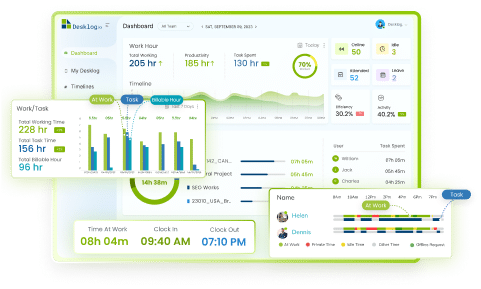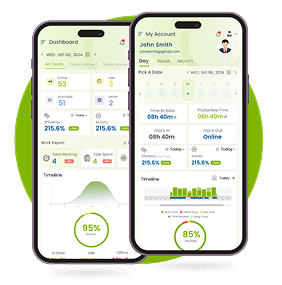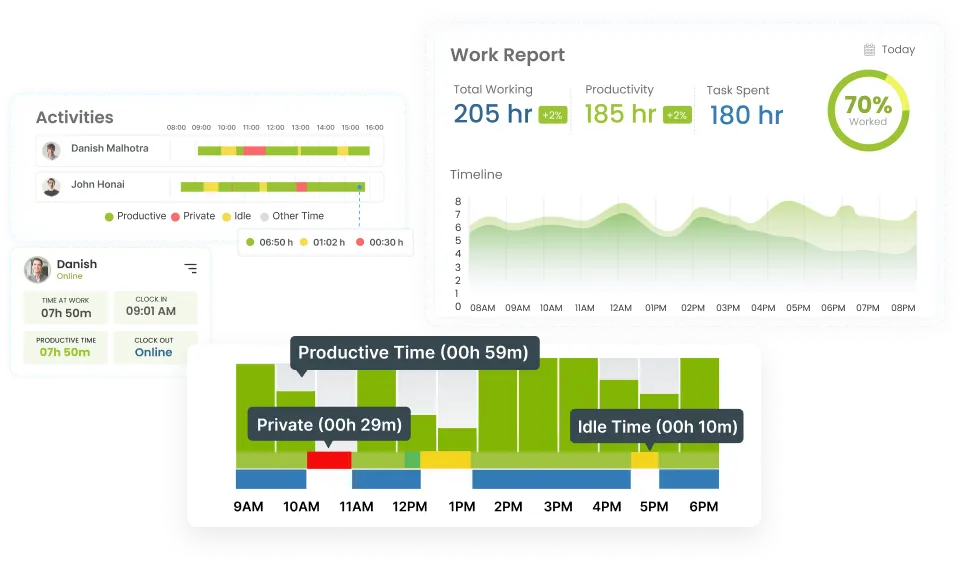Transitioning from Traditional Project Management Software to Project Tracking Tools
The shift from traditional project management software to project tracking tools is a crucial step for modern businesses seeking streamlined and efficient project oversight. And the reason? While traditional software often lacks the agility and real-time insights required for today’s dynamic project environments, project tracking tools offer enhanced collaboration, customizable reporting, and intuitive interfaces. As such, let us look at this blog to explore the key considerations and benefits of making this vital transition.Keep reading!
Boosting Business Efficiency with Project Tracking Tools
Have you ever found yourself overwhelmed with countless tasks and deadlines piling up? As such, managing projects efficiently is crucial for any business to thrive. This is where project tracking tools come into play. They are the best method for businesses looking to streamline their operations and achieve optimal productivity.
But what are these tools exactly, and how do they transform the way businesses operate? Let’s dive in and explore the transformative power of project tracking tools.
Project tracking tools are digital platforms or software designed to monitor and manage the progress of various tasks within a project. They act as a central hub for all project-related information, allowing teams to stay organized, collaborate seamlessly, and track their progress in real-time.
These tools offer a comprehensive overview of the project’s status, including timelines, milestones, and potential roadblocks. Essentially, they serve as a digital assistant, keeping everyone on the same page and ensuring that no crucial detail slips through the cracks 😃
#1 Statistical Fact
According to a 2023 industry survey, the integration of project time tracking tools has led to a 22% increase in productivity and an 18% reduction in project overruns.
How do these tools contribute to the growth and success of businesses, you ask? Here’s how:

Improved Task Management
Tools for tracking projects enable businesses to break down complex projects into smaller, manageable tasks. This facilitates better organization and delegation of responsibilities. Know why? Because it ensures that each team member understands their role and responsibilities clearly. As such, it maximises employee performance.

Enhanced Team Collaboration
Effective collaboration is key to a project’s success. Project tracking tools foster seamless communication and collaboration among team members, irrespective of their physical location. This feature promotes the exchange of ideas and information, fostering a more cohesive and productive work environment.

Real-Time Progress Monitoring
Time tracking tools play an important role in employee evaluation. With these tools, businesses can track the progress of their projects in real-time. This feature allows for timely adjustments and interventions, ensuring that projects stay on track and within the set timelines. So, no more last-minute rushes or missed deadlines!

Data-Driven Decision Making
By providing detailed insights into project performance and resource utilization, these tools empower businesses to make informed decisions. They enable teams to identify patterns, anticipate potential bottlenecks, and allocate resources efficiently, ultimately leading to better strategic planning and execution.
Having said that, project tracking tools are more than just software; they are catalysts for streamlined operations, efficient collaboration, and overall business growth. By enhancing the power of these tools, businesses can elevate their project management capabilities and position themselves as industry leaders.
Understanding the Difference: Project Tracking Tools vs. Project Management Software
Ever wondered about the key differences between project tracking tools and project management software?
While they might seem similar at first glance, tools for tracking projects actually offer distinct advantages over traditional project management software. Let’s look at what makes project tracking tools a cut above the rest.
Project management software generally focuses on planning, scheduling, and resource allocation for projects, as mentioned above. Thus, it is paramount to choose the best project management software to outline the overall project framework, set deadlines, and allocate resources to different tasks. However, it often falls short when it comes to providing real-time insights and granular details about the ongoing project activities.
On the other hand,
Project tracking tools offer a more comprehensive approach, allowing businesses to not only plan and schedule but also closely monitor the progress of individual tasks within the project. These tools provide real-time updates, ensuring that teams stay on top of their tasks and any potential bottlenecks are promptly addressed.
But why are project tracking tools better, you might ask? Let us see.
While project management software serves a valuable purpose in setting the initial framework, project tracking tools take it a step further by providing real-time insights and facilitating smoother project execution. With their enhanced features and capabilities, tools for tracking projects are undoubtedly the way forward for businesses looking to maximize their project management efficiency.
A Comparison Guide Between Project Time Tracking And Project Management Tool
No matter if you are running a small or big business,it is critical to understand the key differences between project time tracking and project management tools. Also, it is essential for maximizing productivity and ensuring effective project oversight. Here’s a comprehensive comparison guide highlighting the distinct features and functionalities of these two essential tools.
| Project Time Tracking | Project Management Tool | |
|---|---|---|
| Focus and Scope | These tools primarily focus on monitoring and recording the time spent on specific tasks or projects. They are designed to help businesses track the hours dedicated to individual assignments, aiding in the calculation of billable hours and overall project costs. | These tools encompass a broader scope, including planning, organizing, and managing all aspects of a project, such as task assignment, resource allocation, and progress monitoring. They are more comprehensive and are geared towards facilitating the entire project lifecycle. |
| Functionality | Their primary function is to accurately record the time spent on various tasks, often using features like timers, timesheets, and manual input options. | They offer a diverse range of functionalities, including task scheduling, team collaboration, document sharing, and progress tracking. |
| Data Insights and Analysis | They excel at providing detailed insights into how time is allocated across different tasks or projects. They generate reports and analytics that help businesses understand how efficiently their teams are utilizing their time and resources. | These tools offer comprehensive data insights on various aspects of the project, such as task progress, resource utilization, and overall project performance. They enable businesses to make informed decisions based on comprehensive project data and analytics. |
| Overall Project Focus | While they contribute to the financial and time management aspects of a project, they are not designed to oversee the project as a whole. | They are tailored to oversee the entire project lifecycle, from initiation to closure. These tools facilitate effective project planning, execution, and monitoring. |
Transitioning from Project Management Software to Project Tracking Tools
While there are many reasons to switch to project management tools, they often come with several complexities that can impact seamless project execution and efficient progress monitoring. Here are four more complexities associated with project management tools:

Cumbersome Integration
Complex project management tools often pose challenges when integrating with other essential software and systems. This often leads to compatibility issues and potential disruptions in data flow, causing inefficiencies in project coordination.

Excessive Resource Requirement
Operating complex project management tools may demand significant hardware resources and high-speed internet connectivity. As such, tracking remote team productivity can be challenging and limit accessibility for members in resource-constrained environments.

High Customization Overhead
Tailoring intricate project management tools to specific project requirements can incur additional costs and time, necessitating extensive customization efforts that may divert focus from the core project objectives.

Reduced Agility
The rigidity of many project management tools can impede the adaptability and responsiveness required in dynamic project environments. Thus, it hinders the ability to swiftly adjust project strategies and priorities in response to changing demands.
In comparison, project tracking tools offer a simplified, efficient, and cost-effective solution, enabling teams to concentrate on essential project tracking functionalities without the encumbrance of unnecessary complexities. Hence, it ensures smoother project execution and better overall performance.
#2 Statistical Fact
Organizations using project tracking tools experienced a 30% reduction in administrative overhead related to project management tasks.
Key Advantages of Project Tracking Tools
Project tracking tools are often a subset of project management software, focusing specifically on monitoring and reporting project progress. Here are four benefits of using project tracking tools over comprehensive project management software :

Enhanced Focus
Project tracking tools streamline the focus on critical elements such as task completion and progress updates. This enables teams to concentrate on key performance indicators (KPIs) and real-time updates, thus fostering better accountability and transparency.

Simplified Interface
With a more straightforward interface compared to comprehensive project management software, project tracking tools offer a user-friendly, intuitive platform. It enables quick access to essential project information and facilitates easy navigation, making them ideal for quick updates and on-the-go insights.

Cost-Effectiveness
Typically more cost-effective than comprehensive project management software, project tracking tools provide a budget-friendly solution for teams looking to primarily focus on monitoring project milestones and progress, without the need for extensive features that may not be essential to their specific project needs, thus maximizing return on investment (ROI).

Customized Reporting
Project tracking tools often allow for the creation of customized reports tailored to specific project requirements, enabling teams to generate insightful, real-time reports on key metrics and progress updates, thus aiding in informed decision-making and strategic planning.
Utilizing Desklog for Comprehensive Project Tracking
Desklog serves as an all-in-one solution for businesses, seamlessly integrating project tracking features that are vital for efficient project management. Let’s explore why Desklog is future of employee productivity by being the best project tracking tool or probably the jack of all trades 😎
Project Time Tracking
With Desklog, you can effortlessly track the time dedicated to each task or project, ensuring accurate time allocation and efficient resource management. So, you can wave goodbye to the hassle of manual time tracking and focus on maximizing your team’s productivity.

Project Billing and Invoice
Desklog simplifies the billing process by providing clear insights into the time spent on specific tasks, enabling businesses to generate accurate invoices for clients. This makes it easier to streamline your billing procedures and ensure transparent transactions, leaving no room for confusion or disputes ✌️

Project Timesheet
Desklog’s user-friendly interface allows for easy creation and management of detailed timesheets, providing a comprehensive overview of the tasks accomplished by each team member. Thus, you can stay organized and keep track of your team’s progress effortlessly.

Project Profit or Loss Analysis
Leveraging Desklog’s analytical capabilities, businesses can delve into comprehensive profit and loss analysis. This allows them to gaining valuable insights into the financial aspects of their projects. Thus, you can identify areas for potential cost-cutting and optimize your project strategies for improved profitability.
Curious to know some tips & tricks for Desklog users? Click here
Desklog is not just a project tracking tool; it’s your dedicated partner in ensuring that your projects run smoothly and efficiently. With its robust features, it simplifies the complexities of project management, allowing you to focus on what truly matters: delivering outstanding results.
Conclusion
Moving from the old project management software to new tracking tools is crucial for businesses nowadays. These new tools help teams work better together and make smarter decisions using real-time information. By using modern tracking tools, companies can save time, reduce risks, and finish projects faster, giving them an edge in today’s competitive market. Make the switch today and supercharge your project management!
















